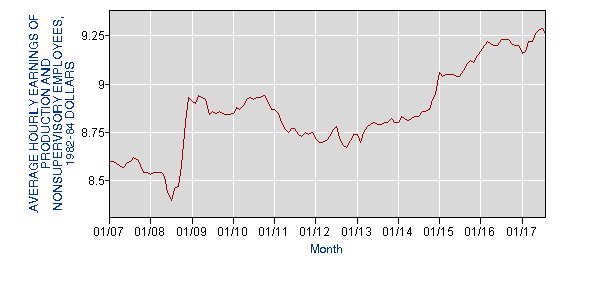September 15, 2017
Yeah, what else is new. After all, no one thinks that a conservative columnist writing for the country’s most important newspaper should have any clue about the topics they cover.
Brooks uses his column today to tell us that workers are getting their share of the economic pie and the real problem is productivity growth.
“The problem of the middle-class squeeze, in short, may not be with how the fruits of productivity are distributed, but the fact that there isn’t much productivity growth at all. It’s not that a rising tide doesn’t lift all boats; it’s that the tide is not rising fast enough.”
Sorry Mr. Brooks, but the numbers don’t agree with you. Here’s the story on average hourly earnings for production and non-supervisory workers since 2007. This is a good proxy for the median wage since it excludes high-end workers like doctors, Wall Street types, and CEOs.

Source: Bureau of Labor Statistics.
After rising by less than 2.0 percent between 2007 and 2013, real wages have started to grow at a respectable pace in the last four years. Still, they are just 8.0 percent above their 2007 level. By contrast, productivity has risen by 13.7 percent over this period. That’s a difference of 5.7 percentage points over the last decade.
For a person earning $40,000 a year, the loss due to the gap between productivity growth and wage growth is equivalent to a tax increase of $2,280 a year. Would Brooks try to tell readers that a tax increase of this magnitude is small change? If we go further back to 1980, when inequality first started to take off, the gap would be closer to 40 percentage points. Anyhow, it’s cute that Brooks wants to tell us not to think about all the money going to rich people and just concentrate on productivity growth, but this stuff is too silly even for children’s games.
There, however, is one point here worth noting. As unemployment has fallen, workers have been seeing their share of gains from productivity growth. This is a huge deal, which points to the importance of Federal Reserve Board policy.
There were many economists who wanted the Fed to take a tighter stance on monetary policy and keep the unemployment rate from falling as low as it has. The decision by the Fed to be relatively slow in raising interest rates has not only allowed millions of additional workers to get jobs, it has also meant higher pay for those who were already working. This makes an enormous difference to the country’s workers, but don’t expect to see anything about it in a David Brooks column.







Comments